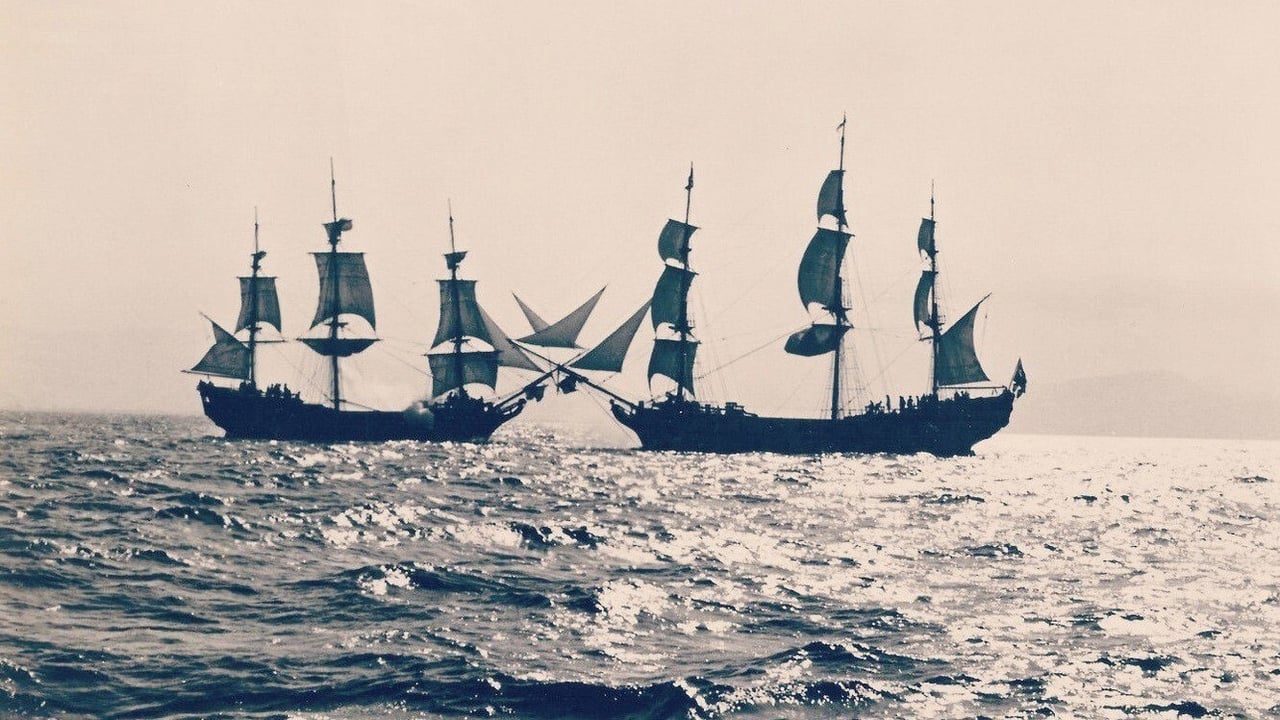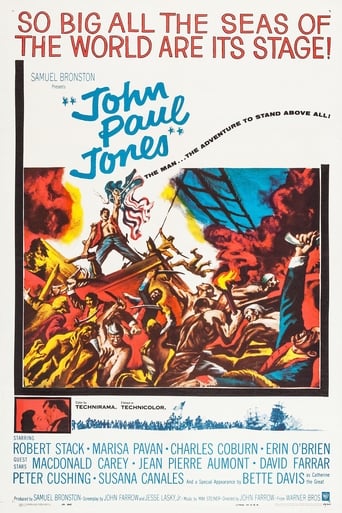



Memorable, crazy movie
The thing I enjoyed most about the film is the fact that it doesn't shy away from being a super-sized-cliche;
View MoreThe story, direction, characters, and writing/dialogue is akin to taking a tranquilizer shot to the neck, but everything else was so well done.
View MoreOne of the best movies of the year! Incredible from the beginning to the end.
View MoreI enjoyed the movie despite its historical inaccuracies, and okay action but that is what I expect and enjoy in old Hollywood movies especially when they were made in color. This movie caught my eye when I saw that it was a Robert Stack movie. Always an imposing figure. And then the added benefit of seeing the lovely Marisa Paven in color! She was Italian, so I must say, Che Bella Donna! Molto bene per me a guadarla a lei. (That is if my Italian is any good?!?). So, while my wife found it boring and quickly gave up on it, I found its slow pace with vivid color a welcome.
View MoreI have always believed that one of the reasons that John Paul Jones continues to be a fascinating figure is that we in America pride ourselves in that Horatio Alger tradition of the young man rising from humble circumstances to obtain wealth and prominence. Riches were not to be for Jones in his lifetime, but you can't fault the historical prominence he obtained as the spiritual if not the historical founder of the American Navy. And as the son of the gardener of a Scottish estate who ran away to see as a boy, his circumstances could hardly have been more humble.Robert Stack makes a commanding John Paul Jones and he's a full blown hero in the tradition of the Samuel Eliot Morrison biography from which this film is adapted. There is a later book about him that came out a few years back written by Evan Thomas which presents Jones as the hero this film makes him out to be.One thing that was overlooked is that it presents Jones as a man unlucky in love. Erin O'Brien-Moore and Marisa Pavan are the Virginia planter heiress and the French noblewoman who were the women in his life. I can assure you that there were many others, Jones was quite the ladies man, he never lacked for feminine companionship when on dry land. Except for a cameo appearance as himself in Pepe, this film was the farewell role for Charles Coburn who played Benjamin Franklin who was Jones's biggest booster in the Continental Congress. He's good as the foxy philosopher Franklin was reputed to be. It is a factual error when you see him at Jones's death bed, Franklin had died a couple of years earlier in the USA. He also did not bring him the news of an offer of a commission in the Russian Navy under Queen Catherine the Great.Bette Davis played Catherine the Great ever so briefly and I wish we got to see more of her. Jones did take command of her fleet and did defeat the Turks as per the film. It was the only time Jones showed what he could do as a naval strategist and he passed the test. His exploits with the Continental Navy were as a single ship in combat.In vain Jones fought vigorously for a permanent Navy for the young United States. You see one of his opponents being John Adams. In an ironic twist of history when Adams got to be the second president of the United States and we were in an undeclared naval war with France, he got a Navy going in a hurry then. Our department of the Navy was founded during his administration, but John Paul Jones was a few years dead by then.Despite some historical errors the film does present John Paul Jones as he would wish to be remembered. And this review is dedicated to the United States Navy, to the many men and women who have served and continue to serve in it, guided by the example of a fine fighting commander in John Paul Jones.
View MoreIn The Revolution only one man attacked British merchant shipping so fierce that the Llyod's Company begged King George to let America go. That same man attacked a British installation in the West Indies and conducted the only foreign incursion on British soil in a millennium. Such a character must have captured taken Hollywood by storm.Billed as the "true" story of John Paul Jones, John Paul Jones offers for Hollywood an accurate summary of the dynamic naval hero's life.Though larger than life, Jones born John Paul stood 5'6" tall, hardly NBA material today but in his time perhaps average. Size was hardly the only obstacle Jones had to overcome. Not favored by birth into a poor Scottish Clan during occupation by Red Coats. John Paul at age 14 goes to sea as ship's boy.Rising to wealth in the West Indies, John Paul (Robert Stack) kills a mutinous crewman. The British magistrate offers friendly advise: flee to America rather than face an Admiralty Court. In Virginia, Jones finds America seething with resentment toward the Redcoats and veering into revolution.When Revolution explodes, Jones accepts a commission. His mission to raid a British fortification in the West Indies brings needed gunpowder to the American cause. In his next command, Jones takes 18 British vessels. Despite all the prizes, the Continental Congress lands Jones at the bottom of their list of naval commanders.Robert Stack's stately appearance and mellifluous voice carry the air of command, even if they do not capture a Scottish burr. Stack plays Jones as the committed hero, unshakable in battle, despite a justifiably anger at the ingratitude Congress would show almost all its talented land and sea commanders.Yet despite the rage General George Washington (Jack Crawford) persuades Jones to return to sea to break the British blockade. Jones promises to steal the derelict Ranger docked at Portsmouth, refit it, raise a crew, and set to sea.On the briny, the French greet The Ranger (according to the movie) with the first salute given to the flag of the United States. History usually gives the honour of the first salute to US colors to the Dutch at St. Eustis.Rushing to Doctor Franklin (Charles Coburn), Jones has a plan to invade the British Isles with a tiny ship. While distracting the entire British Navy with incursions and raids, Jones will force insurance rates to skyrocket. Although the mission was successful, a disgruntled crewman's charges lead to the relief of Jones. Ranger is withdrawn to America. High and Dry in France with only the comfort of his beloved aimee, Aimee Jones regrets his inability to build an American Navy above politics and privateering.Although the King of France cannot provide a ship for Jones, the Queen privately invests in the Bon Homme Richard named after Franklin's "Poor Richard's Almanac." Asea under the American flag, meets the HMS Serapis in an attack so fierce that the two ships are grappled together and firing point blank. Refusing to surrender, Jones declares the famous words, "I have not yet begun to fight." The British surrender just in time for the Americans to transfer to the captured vessel before the good ship Bonhomme flounders.First in war and first asea, Jones finishes last in love. Despite honors and acclaim Jone's girl Aimee is of the blood Royal who cannot marry a commoner. Peace brings a let down. The young republic cannot afford a naval fleet with competent seamen. The Real life Jones warned accurately of future trouble with the Barbary coast.The new Republic would pay dearly ($2000 per seaman captured by barbary pirates) for ignoring Jone's prophesy.Jones departed for Russia to accept a commission as rear admiral in the Czarist Imperial Navy from Catherine the Great (Bette Davis). In the movie, Jones is on assignment from the US government to study the building of a real navy; in reality Jones was out of work and needed a job. While the Empress is less interested in war than playthings, Jones prefers the sea and his command.The real life Jones found the Czarina's navy in worse shape than the American Navy with conscripted serfs unable at seamanship. Jone's reports resulted in trumped up charges. Luckily Jones was permitted to leave for France.The movie version is kinder to the Russians. Despite constant interference and poor ships, Jones has won great battles in the Black Sea for the czarina. However, Jones has fallen critically ill.On return from Russia, Jones is attended by Franklin and Aimee. In real life Jones died alone. Franklin had departed for America long before.Jones probably would have enjoyed the uniqueness of his burial: the first unnoticed almost without ceremony in the foreign cemetery in Paris seething with its own revolution. The remains would probably have crumbled into dust except that an American consular official thought that America might wake up sometime in the future and recall its hero home. The body was placed in a leadened coffin.In 1906 the US emerging as a superpower located the grave now under a Paris street and dis-interned Jones for reburial in the chapel at Annapolis, Md. All the pomp lacking in 1792 was found over 100 years later.
View Morethe other reviewer hit the nail right on the head, this movie is full of historical inaccuracies, the house of burgess is in Williamsburg, Virginie, and John Paul Jone's brother lived and is buried in historic downtown fredericksburg, a good two hour drive from Williamsburg. the Virginie love triangle is rather silly. despite the flaws, i've liked this movie ever since i was a little boy and saw it on TNT during one of the fourth of July marathons... maybe i like my heroes a little stiff, but i thought Robert stack did an alright job. although, it would be nice to see the movie remade with a little more historical accuracy, and maybe have Mel Gibson or Russel crowe or a Scottish actor play jpj... he'd sound a little more accurate, i can watch this movie over and over again.
View More